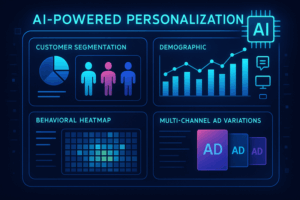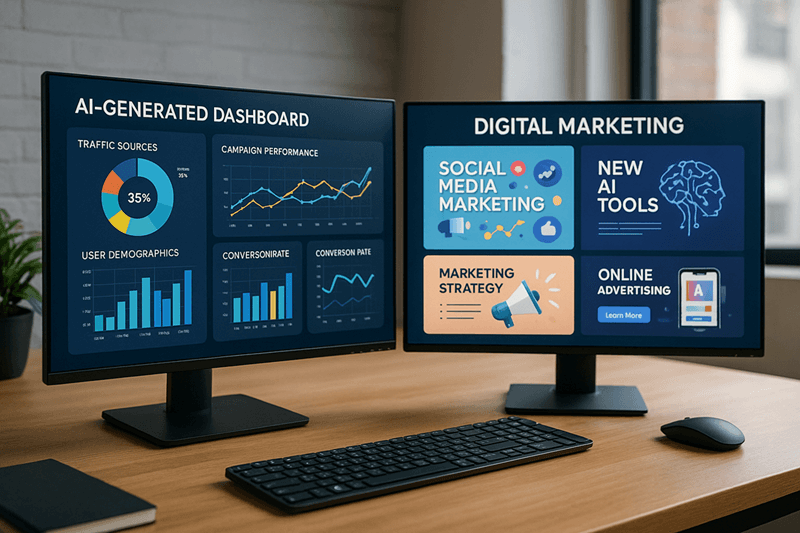Marketing is undergoing its most dramatic evolution in decades. With customer expectations rising and digital channels multiplying, brands need efficient and intelligent tools to stay competitive. Generative AI has emerged as a powerful solution that speeds up campaign creation, elevates personalization, and strengthens decision-making through real-time insights. Today, generative AI is not simply an optional enhancement—it has become an essential element of modern marketing strategies.
Understanding Generative AI and Its Role in Marketing
Generative AI refers to artificial intelligence systems capable of creating content such as text, images, videos, layouts, ad copy, and campaign concepts based on data inputs and learned patterns. When integrated into marketing, these models eliminate the need to start from scratch. Instead, marketers can prompt AI with their objectives, brand tone, and audience data, and receive instant outputs that align with campaign goals. This capability accelerates creative production and enhances consistency across touchpoints.
How Generative AI Accelerates Creative Production

Traditional marketing workflows involve multiple rounds of brainstorming, design drafts, copywriting iterations, and approval cycles. This process often delays campaign launches. Generative AI removes these bottlenecks by producing campaign-ready visuals, headlines, captions, email templates, and video scripts within minutes. By handling the initial creative groundwork, AI frees marketing teams to focus on strategy, brand storytelling, and performance optimization.
Personalization at Scale: The Competitive Advantage
Consumers today expect highly relevant content customized to their interests, behavior, location, and preferences. Generative AI enables hyper-personalization at scale by analyzing large volumes of customer data and generating multiple versions of content tailored to specific audience segments. AI can adapt tone, offers, imagery, and call-to-action messages based on real-time insights. This boosts engagement, increases conversions, and strengthens customer loyalty.
Data-Driven Insights for Smarter Decisions
Generative AI doesn’t just create content; it also guides strategic decisions. AI-powered analytics tools evaluate user behavior, competitor trends, past campaign performance, and broader market signals. These insights inform campaign direction by predicting which formats, styles, and messages will perform best. Instead of relying on guesswork or instinct, marketers make informed decisions supported by accurate data and predictive models.
Workflow Automation: More Efficiency, Less Repetition
Marketing teams often struggle with repetitive tasks such as resizing graphics, writing variations of ad copy, scheduling posts, and tracking performance. Generative AI automates these tasks, improving productivity and consistency. AI can automatically generate A/B test variations, schedule content across platforms, optimize targeting in real time, and create performance reports. This automation reduces manual workload and improves campaign precision.
Supporting Startups and Small Businesses
For small teams and startups, generative AI is a game changer. With limited resources and tight budgets, traditional marketing production can be challenging. AI allows smaller companies to produce high-quality, professional creatives and multi-channel campaigns without hiring large design or content teams. This levels the competitive playing field and enables smaller brands to compete with more established players.
Real-World Metrics That Prove AI’s Impact
Industry research highlights the tangible benefits of AI-driven marketing. Companies using AI tools see campaign deployment speeds increase by up to 40 percent. Personalized content powered by AI boosts conversion rates by 20 to 35 percent. AI-generated creatives can reduce production costs by as much as 70 percent. Additionally, AI-optimized campaign variations consistently generate higher engagement and stronger performance metrics.
The Importance of Responsible and Ethical AI Use
Despite its advantages, generative AI must be used responsibly. Human oversight is essential to maintain brand accuracy, cultural sensitivity, and factual correctness. Marketers should carefully review AI-generated content to avoid misleading statements, bias, or off-brand messaging. Ethical guidelines, data privacy practices, and governance frameworks are crucial when integrating AI into marketing operations.
Conclusion: The Future of AI-Driven Marketing Campaigns
Generative AI is redefining the marketing landscape by improving efficiency, creativity, and personalization. Brands that embrace AI-driven marketing gain a significant competitive advantage, enabling faster execution, smarter insights, and deeper audience engagement. As the technology evolves, marketing will become more adaptive, conversational, and individualized—unlocking new opportunities for innovation and growth.




